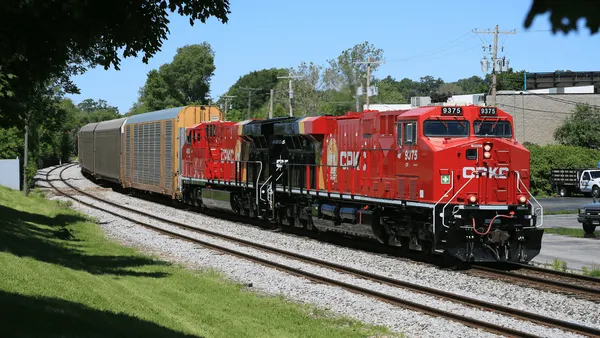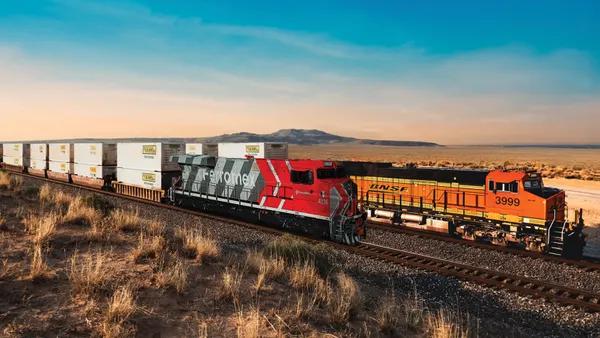UPDATE: Nov. 26, 2019: Canadian National Railway and the Teamsters Canada reached a tentative deal to end the conductors' and yard operators' strike Tuesday. Workers will return to work at 2 p.m. local times Tuesday, with full operations returning Wednesday at 6 a.m. local times. A ratification vote on the collective bargaining agreement will follow within eight weeks according to the railroad. Details of the agreement will be publicly released after the members have had a chance to read it, the Teamsters said in a release.
Dive Brief:
- Canadian National Railway (CN) is operating at roughly 10% capacity after nearly one week of a conductors' and yard operators' strike, stranding ag shippers and propane shipments at a crucial time for Canadian farmers. "Currently, very limited amounts of various commodities are moving across the country. This includes container traffic to keep Canada’s ports fluid to be able to return to normal operations after the strike," the railroad said in a statement Friday. The 10% of CN's capacity still operating is due to the railroad's administrative employees that possess the needed qualifications.
- As of Thursday, negotiations were ongoing "with the help of federally appointed mediators," according to a statement from the railroad's CEO JJ Ruest.
- Dozens of farmers took their tractors to the streets of Montreal Friday in a rolling protest, calling for a resolution to the dispute, which the Teamsters Canadian Rail Conference says revolves around working conditions and prescription benefits. The workers have been without a contract since July 23.
Dive Insight:
The knock-on effects of any freight strike start with the goods rarely transported any other way. Propane — essential for heating and to the agricultural industry in Canada and the Midwestern U.S. — is one such product.
"Rail transportation is extremely important for the propane industry and for Canadians who depend on propane for their homes, businesses, farms and fleets every day," Nathalie St-Pierre, CEO of the Canadian Propane Association, said in a statement. Much of Western Canada's grain crops remain unharvested and propane is essential to keeping grain dry and barns warm in the colder months, along with transporting grain once harvested.
Authorities say Quebec is at risk of running out of propane if the strike doesn't end soon. The teamsters contend that CN is inflating the level of disruption to the propane supply, according to Bloomberg. A total of 3,200 teamster members are striking, but the union says 1,800 locomotive engineers and 600 supervisors can cross picket lines, meaning they can still work. Lyndon Isaak, president of the union, told Bloomberg this should be enough to keep Quebec and Ontario supplied with propane.
The U.S. imported roughly 48 million barrels of propane from Canada in 2018, according to the U.S. Energy Information Administration.
CN and CSX began operating a new intermodal service on Oct. 7, connecting Montreal and Southern Ontario to Philadelphia, New York, New Jersey and the New York City metropolitan area. CSX declined to comment on whether the service is currently operating.
After impacting shippers, a strike will eventually reach the spot markets of the modes left operating.
"Anytime a carrier of this size shuts down the impacts are felt across modes," Charley Dehoney, CEO of Manning's Truck Brokerage in Omaha, Nebraska, told Supply Chain Dive. Rates in the trucking spot markets are stable so far, said Dehoney, but he warned if the Canadian government doesn't step in "we'll see trucks heading North to recover loads coming out of CN's network."
As U.S.-based trucks head over the border into Canada, the spot market will likely tighten on the Southern side of the border, Dehoney said. The Thanksgiving holiday in the U.S. may have come at a good time then, since U.S. demand may be somewhat lower this week.
Further knock-on effects include 70 temporary layoffs at the Port of Halifax, according to The Canadian Press.
"CN calls on the [Teamsters Canada Rail Conference] to accept voluntary binding arbitration by an independent third party selected jointly by CN and the TCRC, or by the Minister of Labour, as a means to end this labour dispute and return immediately to the business of moving the Canadian economy safely and efficiently," CN said Friday.














